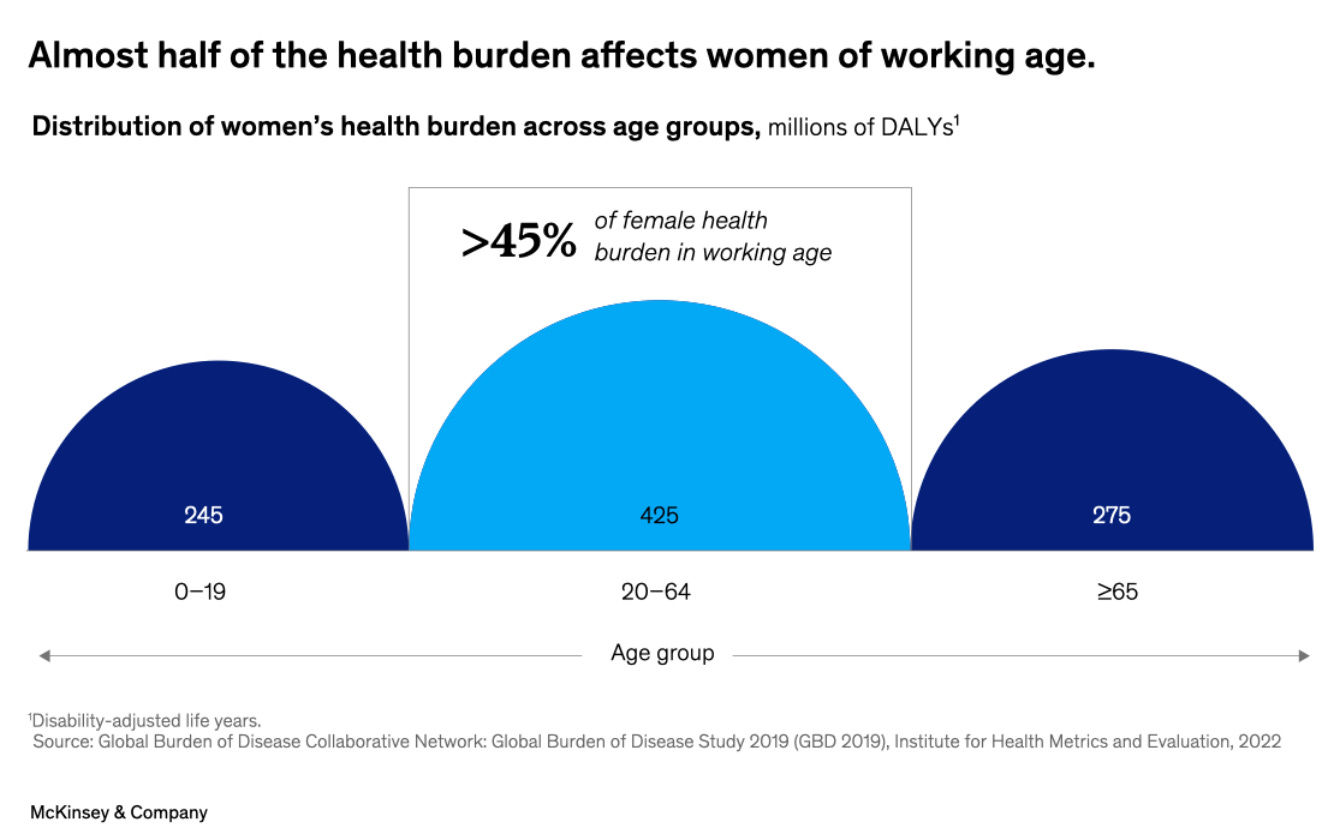Closing The Women’s Health Gap: A $1 Trillion Opportunity.
According to McKinsey & Company, as stated in their report released on January 17th at Davos
A research, published in Davos on Wednesday by the World Economic Forum and the McKinsey Health Institute (MHI), found that on average women were in poor health for 25% longer than men and that this could be cut by almost two-thirds if the health gap was closed.
Recognizing the potential for positive change, investments directed towards addressing women's health disparities have the power to not only extend both the quantity and quality of life but also contribute to a projected annual boost of $1 trillion to the global economy by 2040. Furthermore, closing this gap could have a transformative impact equivalent to 137 million women gaining full-time employment by 2040, offering them the means to support themselves and their families, ultimately contributing to lifting more women out of poverty.
A huge opportunity exists to develop additional solutions for women in the working age group, as almost half of the health burden affects women during their working years. This often results in implications for their capacity to earn income and provide support for themselves and their families.
Private equity and venture capital investors are increasingly channeling investments into women's health.
The surge in these investments is propelled by the emergence of clear opportunities in women's health and the rise of female-led technology (FemTech) start-ups seeking to disrupt the healthcare market. Notably, activity within the FemTech space is concentrated on maternal health patient support, consumer menstrual products, gynecological devices, and fertility solutions.
In the past four years, top deals in the startup landscape predominantly focused on men's sexual and overall health. A McKinsey analysis reveals a significant funding gap, with 11 start-ups addressing men's health concerns, including erectile dysfunction, securing $1.24 billion from 2019 to 2023, compared to eight start-ups addressing endometriosis, which received $44 million. Although funding for erectile dysfunction-related ventures was six times greater, recent trends indicate a shift. Over the same period, newcomers in women's health garnered $2.2 billion in funding, with 60 percent of the top deals exclusively targeting women's health issues such as endometriosis, fertility, and maternal and neonatal health.
Considering the substantial unmet need and the resultant opportunities, those who neglect investments in women's health may risk being outpaced by competitors who tap into this high-potential market.
Conclusion
Acknowledging the significant potential to enhance the well-being and economic opportunities for half of the global population acts as the driving force to bridge the women's health gap. Every aspect of this disparity, encompassing issues like limited education and suboptimal treatments, presents an opportunity for positive transformation with the active engagement of governments, life science innovators, educational institutions, philanthropists, activists, and other stakeholders.
Improving women's health and well-being generates a ripple effect that reaches into families, communities, and nations. By adopting a comprehensive approach through collective action and ongoing investment, not only can we reduce the health disparity, but we can also contribute to enhancing our shared global future.
Other topics that might capture your interest:
📍 The 18 Most Promising Fertility Startups To Watch
As fertility rates decline and people choose to have children later in life, venture capitalists are now recognizing the potential in investing in reproductive tech startups. 👉 Click here to read the full article.
📍Rethinking Employee Healthcare and Benefits in the 21st Century.
Employers are facing increasing pressure to proactively address societal issues, including women's health, health equity, and mental well-being.
👉 Click here to read the full article.
The contents of this newsletter have the potential to influence those around you. Feel free to share it with anyone you believe might find it interesting.✌️
+ Health-Tech innovation is good
Martin
P.S. I used some of the following sources to obtain the data for this article:
(1) McKinsey & Company full report








